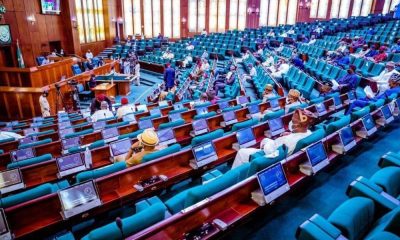The Nigerian House of Representatives is currently deliberating on a bill that aims to extend the time limit for prosecuting sexual offences committed against girls under the age of 13.
The proposed legislation, which has already passed its first reading, is sponsored by Bitrus Laori, a lawmaker representing the Demsa/Numan/Lamurde federal constituency in Adamawa State.
Laori, a member of the Peoples Democratic Party (PDP), seeks to amend existing provisions in the Criminal Code Act to ensure that offenders are not able to escape justice due to an overly restrictive time frame for prosecution.

Current Law: A Two-Month Limit
Under the current provisions of the Criminal Code Act, specifically Sections 218 and 221, sexual offences involving minors, including unlawful carnal knowledge and attempts to engage in such acts with girls under the age of 13, are classified as serious felonies.
Section 218 of the Code prescribes life imprisonment for offenders found guilty of unlawful carnal knowledge, with or without caning, and a 14-year prison sentence for those attempting the crime.
However, a critical aspect of the current law is the two-month limitation for initiating prosecutions after the offence is committed. According to the law:
- “A prosecution for either of the offences defined in this section of this Code shall be begun within two months after the offence is committed.”
This time frame has been widely criticized by legal experts, child rights activists, and lawmakers, who argue that it is insufficient to investigate and gather the necessary evidence to bring a case to trial, especially in sensitive cases involving minors.

House of Representatives Considers Bill to Extend Time Limit for Prosecuting Sexual Offences Against Girls Under 13
Laori, who is spearheading the amendment, argues that the two-month window is far too short and often allows offenders to escape justice. He emphasizes that cases involving sexual offences against minors are typically complex and take time to investigate due to several factors, including:
- Delayed Reporting: Victims of sexual abuse, especially young girls, often delay reporting due to fear, shame, or threats from the perpetrator.
- Gathering Evidence: Investigations require time to collect physical evidence, identify and interview witnesses, and establish a case.
- Witness Cooperation: In many cases, key witnesses, such as family members or community members, may be reluctant to testify due to fear of retribution or social stigma.
- Stigmatization: Victims often face societal stigma, which can lead to reluctance in coming forward or participating in the legal process.
According to Laori, these challenges make the existing two-month limit impractical. As a result, many offenders have managed to escape prosecution simply because the legal system cannot meet the two-month requirement.

Proposed Amendments
The proposed bill seeks to amend the time limit for prosecution as stated in Section 218. The amendment would replace the current provision:
- “A prosecution for either of the offences defined in this section shall be begun within two months after the offence is committed,”
with: - “A prosecution for any of the offences defined in this section shall be commenced within two years after the offence is committed.”
Laori argues that extending the prosecution period to two years would provide a more realistic timeframe to investigate and gather necessary evidence while ensuring that perpetrators cannot evade justice due to procedural technicalities.
Impact of the Amendment
Laori and supporters of the bill believe that extending the time limit would have several important benefits:
- Improved Access to Justice for Victims: Victims of sexual abuse, especially young children, would have a better chance of seeing justice done, even if there is a delay in reporting the crime.
- Increased Accountability: Offenders would no longer be able to avoid prosecution merely by exploiting the two-month window, which could lead to more convictions and longer sentences for perpetrators of these heinous crimes.
- Deterrence Effect: The knowledge that offenders cannot escape prosecution due to the time limitation may act as a deterrent to potential perpetrators, knowing that the law will pursue them regardless of the time elapsed.
Furthermore, Laori has argued that the removal of the two-month time limit would serve to send a strong message to society that the justice system takes child protection seriously, and that perpetrators of sexual violence against minors will not be able to evade responsibility through legal technicalities.
Legal and Social Context
The issue of sexual violence against minors has been a growing concern in Nigeria, with increasing awareness and calls for stronger laws to protect children from abuse. However, the legal framework has often been criticized for being inadequate in addressing the complexities of such crimes.
In recent years, child rights advocates and legal experts have consistently called for the reform of the Criminal Code to ensure that sexual offences involving minors are dealt with in a way that acknowledges the sensitive nature of the cases and the challenges faced in bringing perpetrators to justice.
Extending the prosecution window for such cases is viewed as a step toward strengthening the legal system’s ability to effectively combat child sexual abuse.
The bill has now passed its first reading in the House of Representatives, and is expected to undergo further discussions and amendments before it can be debated in the Senate. If it becomes law, this legislative change could have significant implications for how sexual offences against minors are prosecuted in Nigeria.
While the bill’s passage would mark a significant victory for child rights advocates and victims of sexual violence, the challenge remains for lawmakers, legal practitioners, and the judicial system to ensure that the necessary resources and support are in place to implement such a law effectively.
In conclusion, the proposed amendment to extend the time limit for prosecuting sexual offences against girls under the age of 13 represents a significant step forward in ensuring justice for victims and holding perpetrators accountable.
It is a necessary reform that reflects the growing recognition of the need for a more robust and fair legal system for vulnerable children in Nigeria.









